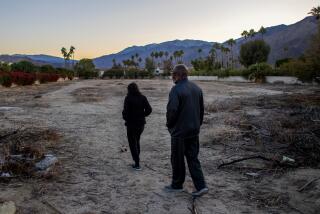Leisure World in Asbestos Cleanup Dispute
- Share via
Leisure World resident Erika Furlong-Swenson thought it was bad enough that she had to spend months away from home after a fire in a neighbor’s unit filled hers with smoke.
But then the air tested positive for asbestos, and a cleaning crew came in and tossed out all of her furniture and clothes, her television and refrigerator. Workers threw away her cuckoo clock and Bavarian costumes from Germany and a floral watercolor painted by one of her friends.
And for this, she was billed $4,995.
“I cannot pay it. I don’t have the money,” said Furlong-Swenson, 63, who already has spent thousands of dollars replacing her belongings and who, like most other Leisure World residents in Seal Beach, lives on a fixed income. “The fire was not my fault. I don’t own the building.”
Furlong-Swenson’s dilemma is shared by 85-year-old Hildegard Zeller, who received a bill for $2,475. Their plight was enough to rally more than a dozen other residents who have been picketing on their behalf since Saturday outside the main gates of the retirement community, which opened in 1962.
Leisure World officials had no comment Monday.
This is only the latest controversy involving the Seal Beach Leisure World.
Last year, the 18-member board of directors that governs the community of 9,000 residents banned dog-walking, even though pets are allowed inside the gated community. The board also proposed a ban on any “statement of opinion” by members of the lower boards without the approval of the foundation’s board of directors, prompting some residents to accuse them of “fascist thinking.”
Some of those same residents, part of a group called Concerned Shareholders of Leisure World, believe the women’s bills should be paid by the corporation that owns the residential buildings -- the same corporation that pays for the fire insurance and collects monthly association fees from residents ranging from about $200 to $400.
Residents of Leisure World pay a lump-sum cash payment for their individual share of the mutually owned real estate. Today, an average two-bedroom unit sells for about $150,000. The monthly association fees cover maintenance, security, recreation amenities and other costs.
But any sense that Leisure World was providing carefree living was spoiled in January when fire broke out in the unit adjacent to Furlong-Swenson’s and Zeller’s units. Although their homes were not damaged by fire, they sustained smoke damage and the women were later told the apartments tested positive for asbestos, an insulation material that apparently had been loosened from behind the walls by firefighters. Asbestos was banned in 1979 in most construction because inhalation of its tiny fibers can cause a fatal lung disease.
Before repairs could be made to their homes, both women were told they had to sign the necessary paperwork. They were put up in a hotel or an apartment for months. Only when they returned home did they discover that most of their belongings had been carted away.
“I had 37 books which cannot be replaced. They were from Germany and France,” Zeller said. “All the valuable stuff is gone.... And then they’re giving me a cleaning bill for the crummy stuff they left.”
Among the other items thrown away were her knitting supplies, a walker, Christmas ornaments, a vacuum cleaner, lamps and all of her furniture.
The whole situation has cost Zeller sleepless nights, in part because she has enjoyed her 10 years at Leisure World and doesn’t want to cause a fuss.
Neither of the women complained very loudly, but when word of their bills circulated through the community, others rallied behind them.
Zeller’s only action was to send an itemized list of her lost items via certified mail to corporation president Sandy Goldfarb -- a fellow resident at Leisure World. The letter came back unclaimed. He declined to comment Monday.
Residents have been equally stymied by officials at the Golden Rain Foundation, the nonprofit corporation that manages Leisure World, who have suggested that they sue the resident whose apartment burned. Administrator Bill Narang did not return calls for comment Monday.
“They tell us that they own the building and we just own a share,” said resident Pauline Hamric, one of the pickets. “If they own the building, then they own the asbestos.”
More to Read
Inside the business of entertainment
The Wide Shot brings you news, analysis and insights on everything from streaming wars to production — and what it all means for the future.
You may occasionally receive promotional content from the Los Angeles Times.











